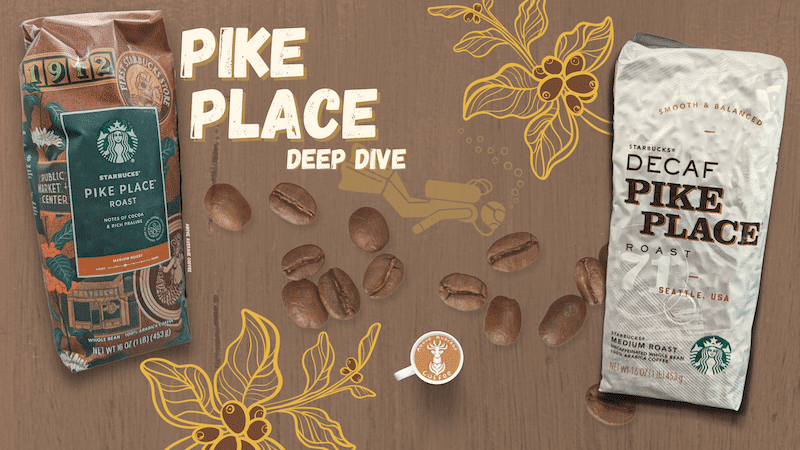Coffee is great. It’s delicious versatile and there’s an option to suit everyone.
Black coffee can be brewed as espresso, americano, filtered or instant. If you like dairy then there’s latte, cappuccino, flat white, macchiato, filter or instant coffee with milk. Following on from this is a never-ending list of sugars and syrup combinations that can turn the good ole espresso into a Frappuccino With Extra Whipped Cream And Chocolate Sauce.
The combinations are endless, coffee seems to be getting more complex by the decade. The real question that remains to be answered is, “Is black coffee better for you?”
Black coffee is better for you. Plain black coffee has numerous health benefits such as increased longevity, lower risk of type 2 diabetes and liver disease. It’s packed full of antioxidants and a plain cup of black coffee can be considered a healthy option. However, adding milk and sugar can negate these benefits in certain circumstances.

How Is Coffee Good for You?
Coffee has endured a poor representation in the past and was once thought to be linked to the development of certain types of cancer. Thankfully, more up to date research has dispelled this.
Studies now support that coffee drinkers are actually more likely to have an increased lifespan. Of course, many other factors play a role here, but it’s still encouraging for coffee lovers.
This recent study has found that coffee consumers have lower risk of some types of cancer such as prostate, endometrial, liver and melanoma. Benefits extend to reduced risk of suffering from type 2 diabetes and liver disease. It also appears to slow progression of liver disease so may be beneficial for individuals already suffering with this.
Coffee also seems to lower your risk of developing Parkinson’s disease, Alzheimers disease and even depression. Coffee contains many healthy antioxidants which help protect your cells against damage. With all this data emerging, the potential health benefits seem immense. The next question is, how do I maximise these benefits?
Which Is Better? Whole Bean vs Instant Coffee
Whole beans bought to be ground at home or fresh ground coffee can be a bit more time consuming than instant coffee. If all you have is a kettle then instant is a great choice. Just a teaspoon full, some warm water, and there you go!
Fresh coffee is either the whole beans themselves, roasted and packaged ready to grind at home or, you can buy them pre-ground up for you. The course, ground beans do not dissolve in water so once the brewing is complete, they need to be removed from the liquid.
A French press, drip machine, V60, aeropress, espresso machine all take care of this for you! More preparation time and equipment is needed for fresh coffee and there’s so many options, you’re bound to find one that suits if fresh coffee is your preferred beverage.
Back to the health benefits, what is the difference between instant and fresh coffee?
Well, instant coffee is actually just fresh coffee that has been brewed and then dehydrated back into the powder you buy in a jar. This means that instant coffee has pretty similar benefits when compared to fresh. The only real differences are that instant contains slightly lower levels of antioxidants, the caffeine content is lower, and many say it isn’t as tasty.
Different people respond in different ways to caffeine, and if you find that fresh coffee leaves you jittery, sweaty, anxious and heart racing then the lower caffeine content of instant, or even decaf beans, may be better for you.
Black coffee vs Espresso
Black coffee is the term used to describe a coffee brewed without anything else added. It can be instant or fresh as long as no milk or creamer is added.
The espresso is a popular drink in Europe and on the surface may look completely different from your average cup of americano. Actually, an espresso is a coffee brewed by forcing pressurized steam through the coffee grounds as opposed to warm water. This leaves you with a very small volume of water containing all the goodness you would normally consume.
So, an espresso is just a very concentrated black coffee. The americano coffee is just an espresso coffee topped up with hot water so the concentrated coffee is diluted.
As health benefits go, there really isn’t any difference between an espresso and a cup of black coffee, so just pick whichever brew you prefer and enjoy!
Is Adding Milk To Your Coffee Bad For Your Health?
Milk is a controversial subject these days and has received a lot of negative press. But what is the truth when it comes to consuming milk with your coffee?
Well, first of all, if you have a dietary allergy or intolerance then milk is a definite no. Some people respond very poorly to milk consumption. If you feel ill, bloated, have stomach cramps, nausea or diarrhoea after drinking milk then consider a non dairy alternative like soya, coconut, oat or almond milk.
Are there any benefits to milk?
Well milk contains lots of calcium, phosphorus and potassium as well as vitamin A and B12. It does contain saturated fat and cholesterol. These two also get a bad rep, and although it’s true that when consumed in excess they can cause health issues, in moderation, as part of a healthy diet there’s no need to be afraid of them.
The “good” form of cholesterol found in milk are useful for helping your body make essential hormones and messengers as well.
Another issue with milk is the production.
Some of the large companies that intensively produce milk use growth hormones to maximise the milk yield per cow. These hormones are detrimental to the health of the cow. Some people are concerned they may also be detrimental to human health.
Whist evidence is not conclusive there are ways to eliminate this potential risk. Choosing organic, ideally locally produced milk from pastured cattle will remove this factor.
In summary, adding fresh milk to coffee doesn’t remove any of the health benefits already mentioned and may benefit by adding more vitamins and calcium to your diet. If you suffer from skin conditions or struggle to digest milk then it’s best avoided.
Creamer?
Non-dairy creamer may sound like a good alternative to milk if you love the dairy taste but don’t get on well with milk.
The problem is, non-dairy creamers, although lactose is removed (the most common culprit for dairy intolerances) they still contain casein which is a protein that can still set off allergies in some people. This also makes the product not suitable for vegans so watch the label when choosing your milk alternatives!
Creamers are often based on vegetable fats and contain lots of added ingredients like sugar, sodium and corn syrup. They are highly processed and absolutely not a healthy alternative to milk.
If dairy isn’t for you then trying a non-dairy milk like almond, soya or oat milk is a better alternative to keep that cup of coffee health boosting!
Sugar?
Sugar is lovely. It sweetens even the most bitter of coffees and can give you that great energy boost in the morning.
The problem with sugar is that is certainly can’t be considered a health food. From dental decay to type 2 diabetes, sugar has a lot to answer for. It is high in calories and can rapidly contribute to weight gain.
If you only have a coffee once every other day and you are fit, healthy and otherwise have a very low sugar diet then one small spoonful is unlikely to be hugely damaging. But if you are drinking 2 or more cups a day then those spoonfuls quickly add up!
Sweetener?
So we have established that sugar isn’t a great option for health benefits if you enjoy regular cups of coffee. If you have a real sweet tooth then adding sweeteners may be inviting.
If health is at the top of your priorities then be cautious. Processed sweeteners like Splenda is made from sugar by a process called chlorination. The end result is far sweeter to the taste than sugar so less can be used and is not digestible.
They can cause increased sugar cravings and the health risks associated have been linked to obesity. They are best avoided if you want that cup of coffee to remain a healthy option.
Natural plant sweeteners like stevia also have mixed reviews. Some people experience digestive upsets and it has been shown to link to a dysregulation in gut flora. Your gut flora is essential for regulating a huge array of your bodies systems such as your immune system and is even responsible for your brain activity through serotonin and dopamine systems.
This all seems doom and gloom when it comes to sweetening coffee. The good news is that there are some healthier alternatives for adding some sweetness to your cup. Read on to find out how.
Four Healthier Options For Sweeter Coffee
1. Honey
A natural form of sugar, honey is delicious and versatile. Raw honey (un-processed) has been shown to be rich in antioxidants, is anti-inflammatory, anti-bacterial and aids wound healing. At 64 calories per tablespoon it is a good sugar alternative when used in moderation.
2. Cinnamon
Cinnamon has been linked to many health benefits such as helping regulate blood sugar and anti-inflammatory actions. The scientific evidence is somewhat lacking to really drive home these claims but what can be certain is cinnamon has next to no calories, is delicious and is certainly not unhealthy for you!
3. Unsweetened Cocoa Powder
Chocoholics celebrate! A pinch of unsweetened cocoa powder can add a chocolaty richness to any brew. It doesn’t take away from the health benefits of a cup of black coffee and makes a decadent beverage.
Cocoa powder doesn’t dissolve well so just be sure to add the power to the coffee grounds or mix into a paste using a little water beforehand to ensure no lumps!
4. Vanilla Extract
¼ to ½ teaspoon of vanilla extract is all that’s required to give coffee that wonderful, all too familiar aroma and taste. Zero calories means this partnership is a winner to help manage your weight whilst still enjoying a sweeter cup of coffee.
Related Reading
How To Make Black Coffee Less Bitter (Tips And Tricks To A Better Brew)





